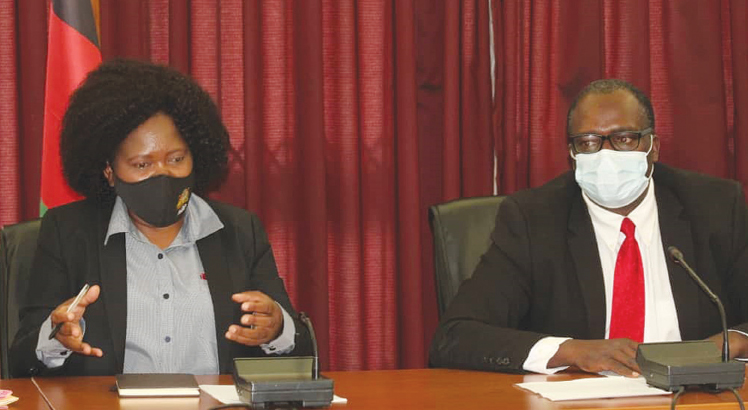Treasury sets June deadline on payment hiccups
Government ministries, departments and agencies (MDAs) will have to wait longer to access timely payments as Treasury has committed to resolve the government payment system bottlenecks by June this year.
While addressing the challenges facing the payment system, Treasury has assured that a seamless free-flowing payment system is possible within the shortest period of time.
Speaking during a media briefing yesterday in Lilongwe, newly-appointed Secretary to Treasury MacDonald Mafuta Mwale and Accountant General Jean Munyenyembe admitted challenges in the payment system, but said progress is being made to resolve them.

press conference yesterday in Lilongwe
Since the current financial year rolled out last July when Treasury also fully rolled out the new Integrated Financial Management and Information System (Ifmis), MDAs have been left choked with payment woes due to system failures.
Mwale said there have been challenges in the past in training end users, especially in preparation of electronic payment vouchers, but slowly they are rectifying the challenges.
He said: “To be honest we acknowledge the challenges and we share the frustrations that MDAs have in terms of accessing resources that we ably push through the system.
“We are working on the system and it involves a number of institutions and we are currently discussing on how we can help each other in terms of fast-tracking the payments.”
On her part, Munyenyembe said the end user training for key personnel manning the system was done.
She said key people accounted for 1 200 trained, while other personnel trained totalled 1 500.
Munyenyembe said: “In total, including other cadres, government is supposed to train 3 000 end users meaning we are now remaining with 1 500 and the training is ongoing.”
She said apart from working on the network challenges the payment reconciliation was now happening in real-time due to the adoption of the electronic funds transfer (EFT) system.
On the interface between Ifmis and Human Resources Management Information System (HRMIS), which is critical to curb ghost workers, Mwale said the system is interlinked as every civil servant has updated details such that when there are changes on employee status, the system is updated.
On the Ifmis and Reserve Bank of Malawi interface, which has been a challenge, Munyenyembe said there is good interface, but the major challenge has been failure to notify her office when the payment has missed deadline for reprocessing.
The rolling out of the EFT, to replace issuance of cheques in the current financial year, has been a challenge according to the two officials, as MDAs have been playing a catch up in preparing electronic vouchers for the new Ifmis system to recognise and process.





